#booker prize winner
Explore tagged Tumblr posts
Text
History is a silent record of people who could not leave, it is a record of those who did not have a choice, you cannot leave when you have nowhere to go and have no way to go there, you cannot leave when your children cannot get a passport, cannot go when your feet are rooted in the earth and to leave means tearing off your feet.
- Paul Lynch, Prophet Song
11 notes
·
View notes
Text
ORBITAL - Samantha Harvey (2023)
I’m nearly halfway through The Stand by Stephen King, a book I’ve read over 30 years ago as a young teenager, and was prompted to read again by the ominous The Deluge. Still unsure whether King’s magnum opus had drawn me in already, I felt in need of a break. A day after Samantha Harvey won the 2024 Booker Prize with Orbital, a novel of only 136 pages, I read a review about it on Calmgrove. It…
#2020s#Booker Prize winner#Hawthornden Prize winner#InWords Literary Award winner#Literature#Non-SFF fiction#Orbital#Review#Samantha Harvey#Science Fiction
1 note
·
View note
Text
Orbital
Semantha Harvey’s fifth book – Orbital – is the winner of the Booker Prize this year. Not a long book but it seemed compacted with ideas. I liked the book but had to read it in small bites…almost a meditation on being. As she follows a day in the life of six international astronauts circling the Earth on a space station, Harvey creates a beautiful story without a plot or drama. Combining art,…
0 notes
Text
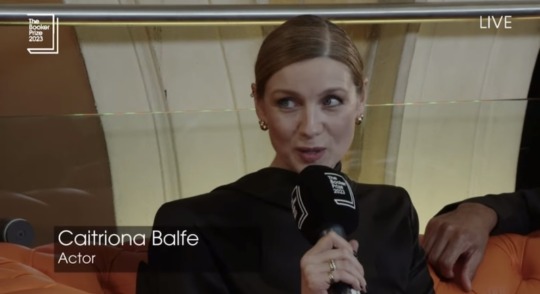
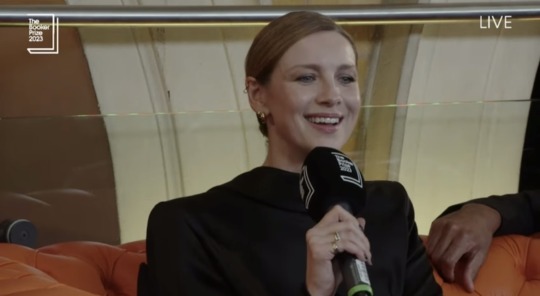
Caitríona in conversation at the 2023 Booker Prize presentation
Caitríona’s conversation starts at 21:41
Video 📹 clip from YouTube (link above clip)
Remember… ever since I remember, my mum brought us to the library; that was our weekly thing. We went in and picked four or five books. I grew up in a very small village and it was just having this window into so many places in in the world. — Caitríona Balfe
Brian’s Post from Sunday
#Tait rhymes with hat#Good times#Prophet Song#Paul Lynch#Winner#2023#Booker Prize#YouTube Live#Old Billingsgate#26 November 2023#London#YouTube#My screenrecording
67 notes
·
View notes
Note
Hello! Do you have any recommendations of books to cry to? Not necessarily sad books, anything emotional. I just need to cry about something that’s not ny actual life!!
golly, tall order without knowing what you like or what makes you cry! but i’ll give it a shot. the vaster wilds by lauren groff, which is historical; the naming song by jedediah berry, which is fantasy; be holding by ross gay, which is poetry. all published within the last few years and deeply felt.
the one book i’ve never finished because it stirs up too much emotion in me even though i love it is the shell collector by anthony doerr, which is a book of short stories.
if you tend more YA-ish i like code name verity by elizabeth wein and a tree grows in brooklyn by betty smith.
i feel like this is a deeply random grouping but i tried to cast a wide net. i hope something here looks interesting!
#anthony doerr’s novel all the light we cannot see (which won a pulitzer) also made me cry but i only read it the once#george saunders’ lincoln in the bardo (man booker prize winner) has never made me cry but has made me feel huge emotions about grief#books#ask
14 notes
·
View notes
Text
prophet song was harrowing, a difficult read but an important one especially now more than ever
#the last two chapters.....pure depression#turns out booker prize winners can be good after all#i can't believe the criticism some people have about eilish not leaving immediately like do You think you could just pack up your life#and leave just like that#everything you've ever known you'd be fine leaving just like that?
3 notes
·
View notes
Text
I am ESCTATIC to hear that Orbital won the 2024 Booker Prize!! It's not often a short, plotless, sci-fi book wins such a major award. One of my favorite reads all year--a poetic ode to the Earth. Congrats to Samantha Harvey!
#orbital#samantha harvey#literary fiction#science fiction#booker prize winner 2024#booker prize 2024
1 note
·
View note
Text
*reading a book that has multiple highly prestigious prizes* why is nobody talking about this book
1 note
·
View note
Text

– Shehan Karunatilaka, The Seven Moons of Maali Almeida
#our protagonist is a dead man who sets out to solve the mystery of his own death#magical realism#afterlife#gay protagonist#lgbtqia+ books#South Asian literature#Asian author#Sri Lanka#2022 Booker Prize winner#book quote of the day#book recommendations
1 note
·
View note
Text

The Bone People
Keri Hulme
The powerful, visionary, Booker Award-winning novel about the complicated relationships between three outcasts of mixed European and Maori heritage"This book is just amazingly, wondrously great." --Alice Walker In a tower on the New Zealand sea lives Kerewin Holmes: part Maori, part European, asexual and aromantic, an artist estranged from her art, a woman in exile from her family. One night her solitude is disrupted by a visitor--a speechless, mercurial boy named Simon, who tries to steal from her and then repays her with his most precious possession. As Kerewin succumbs to Simon's feral charm, she also falls under the spell of his Maori foster father Joe, who rescued the boy from a shipwreck and now treats him with an unsettling mixture of tenderness and brutality. Out of this unorthodox trinity Keri Hulme has created what is at once a mystery, a love story, and an ambitious exploration of the zone where indigenous and European New Zealand meet, clash, and sometimes merge.
Winner of both a Booker Prize and Pegasus Prize for Literature, The Bone People is a work of unfettered wordplay and mesmerizing emotional complexity.
(Affiliate link above)
#queer#queer history#lgbt#lgbt history#gay history#making queer history#asexual books#asexual history#aromantic books#aromantic history
294 notes
·
View notes
Text
She turns on the radio awaiting the news and steps outside to the washing line, watching the trees in roseate light and wondering what it is they can know, perhaps it is true what they say, how the trees sense the air and speak their terror through the ground, letting other trees know that peril has come, what sounds in the sky like some all-consuming fire chewing wood in its mouth.
- Paul Lynch, Prophet Song
3 notes
·
View notes
Text








Gillian Anderson attends The Booker Prize 2024 winners announcement at Old Billingsgate on November 12, 2024 in London, England.
69 notes
·
View notes
Text
Writers from around the globe including Lee Child (creator of Jack Reacher), Bernard Henri-Lévy (Philosopher and Author), Herta Müller (Author, Poet, and Nobel Prize Award Winner), Sir Simon Schama (Historian and Author), Howard Jacobson (Booker Prize-winning Author), Simon Sebag Montefiore (Historian and Author), Adam Gopnik (Writer), Yossi Klein Halevi (Author), David Mamet (Author & Pulitzer Prize Winner), Elfriede Jelinek (Author and Nobel Prize Award Winner), join entertainment leaders, Mayim Bialik, Debra Messing, Julianna Margulies, Scooter Braun, Haim Saban, Ynon Kreiz, Ozzy Osbourne, and Gene Simmons amongst many others, to reject boycotts against authors and literary institutions.
LOS ANGELES (October 30, 2024) — More than 1000 leaders from the literary and entertainment industry signed an open letter released by the non-profit entertainment industry organization Creative Community For Peace (CCFP) in support of freedom of expression and against discriminatory boycotts.
The letter comes in response to continued efforts to boycott, harass, and scapegoat Jewish and Israeli authors and literary institutions. Among the signatories are Nobel laureates, Pulitzer Prize winners, and Booker Prize winners.
Booker Prize-winning author, Howard Jacobson said: “Art is the antithesis to a political party. It is a meeting place not an echo chamber. Art explores, discovers, differs, questions and surprises. Precisely where a door should be forever open, the boycotters slam it closed.”
Recent calls to boycott Israeli literary institutions follow a year filled with efforts to demonize and ostracize Jewish authors across the globe. In the last year, bookstore appearances have been canceled based on authors’ identities and book readings have been shut down. Activists have publicized lists of “Zionist” authors to harass and just last week, ads for a book with ‘Israel’ in the title were rejected.
Author of the Jack Reacher novel series, Lee Child said: “Politically targeting novelists, authors, and publishing houses based on their nationality is misguided. At a time when dialogue is paramount and when compromise can lead to peace, castigation and blanket boycotts are counterproductive. The written word, and the dissemination of it, must always be protected, especially in times of heightened tension. And to achieve peace, we must humanize one another and build bridges across communities through the open exchange of ideas. Literature allows for that. Boycotts hinder it.”
The letter highlights the unique role that writers and books play in society, “We believe that writers, authors, and books — along with the festivals that showcase them — bring people together, transcend boundaries, broaden awareness, open dialogue, and can affect positive change.” It continues, “We believe that anyone who works to subvert this spirit merely adds yet another roadblock to freedom, justice, equality, and peace that we all desperately desire.”
Actress and Author Mayim Bialik said, “Harassing authors, canceling bookstore appearances, and boycotting people based solely on their identity is disturbing and polarizing in ways that cannot be dismissed or minimized. Attempts to dictate “who” or “what” should be published have nothing to do with any path to coexistence or peace. This kind of rhetoric encourages demonization and hatred. As an author and as a creative, I believe in peace, I believe in humanity, and I believe in meaningful discourse. Silencing and sowing discord in this way reduces complex individuals to oversimplified caricatures which only hardens existing hostility and makes the hope for peace inch farther away.”
Philosopher and Author Bernard-Henri Lévy said: “I have always believed in the power of ideas and truth. I have always been in favor of debate, clash of opinions, even the confrontation of convictions. But what we have here is not a clash of opinions or a debate. Boycotting Israeli writers, publishers and festivals is pure anti-Semitism – and it’s anti-democratic and dangerous. The goal of this boycott is the delegitimization of the only Jewish state in the world—Israel. It is a moral obscenity and must be firmly condemned by all free-thinking and democratic citizens of the world.”
Author and historian Simon Sebag Montefiore said: “The resort to witch hunt is always dangerous and ugly especially when the inquisitors are writers. History is full of examples of self-righteous cadres of self-appointed judges who tried to enforce their version of purity by excluding people. Whatever one thinks of this tragic Middle Eastern war, who judges who is good, who bad? Once started where would it stop? Who is pure enough?”
The statement is the first of its kind – a call from the literature and entertainment community to unequivocally voice support against boycott attempts based on identity or litmus test.
The letter states: “Regardless of one’s views on the current conflict, boycotts of creatives and creative institutions simply create more divisiveness and foment further hatred.” The letter concludes: “We call on our friends and colleagues worldwide to join us in expressing their support for Israeli and Jewish publishers, authors, and all book festivals, publishers, and literary agencies that refuse to capitulate to censorship based on identity or litmus tests.”
CCFP Executive Director Ari Ingel said, “Authors, writers, and literary groups have faced non-stop harassment by a dedicated group of illiberal activists since October 7th. This is not just about Israeli authors. This is a coordinated campaign to bully and threaten anyone who refuses to condemn Israel, which targets Jews and their allies worldwide. These boycott calls, now being led by members of the literary community themselves, are reminiscent of the 1933 boycott of Jewish authors, when antisemites burned over 25,000 books. The works of Jewish authors like Albert Einstein and Sigmund Freud, alongside American works by Ernest Hemingway and Helen Keller were burned. This is where things are once again headed.”
Signatories Include:
Howard Jacobson, Booker Prize-winning Author; Lee Child, Author; Mayim Bialik, Actress & Author; Dr. Simon Sebag Montefiore, Historian and Author; Bernard-Henri Lévy, Philosopher and Author; Sir Simon Schama, Historian and Author; Yossi Klein Halevi, Author; Elfriede Jelinek, Playwright, Author and Nobel Prize Award Winner; David Mamet, Author & Pulitzer Prize Winner; Ozzy Osbourne, Artist and Author; Sharon Osbourne, Author, Manager, TV Personality; Herta Müller, Author and Nobel Prize Winner; Dara Horn, Author; Debra Messing, Actress, Gene Simmons, Author & Artist; Julianna Margulies; Actress; Jerry O’Connell, Actor; Douglas Murray, Author; Scooter Braun, Founder/CEO, Hybe America, Ynon Kreiz, Chairman and CEO, Mattel, Inc.; Haim Saban, Chairman and CEO, Saban Capital Group; Aaron Bay-Schuck, CEO/Co-Chairman Warner Records; Sherry Lansing, Former CEO of Paramount Pictures; Rick Rosen, Co-Founder, Endeavor; Jenji Kohan, Writer/Producer; Adam Gopnik, Writer; Deborah Harris, The Deborah Harris Agency; Diane Warren, Songwriter; Anders Rydell, Author; Ilya Kaminsky, Author and Poet; Elisa Albert, Author; Aayan Hirsi Ali, Author; Lionel Shriver, Author; Noreena Hertz Author; Sir Niall Ferguson Milbank Family Senior Fellow at the Hoover Institution and Author; Rebecca De Mornay, Actress; Jennifer Jason Leigh, Actress; Amy Sherman-Palladino, Writer and Producer; Matti Friedman, Author; Neil Blair, Partner, The Blair Partnership; Anthony Julius, Attorney and Author; Gail Simmons, Author; Ben Silverman; Chairman & Co-CEO, Propagate Content; Bret Stephens, Pulitzer Prize Winner; Fernando Szew, President, Fox Entertainment; amongst many others.
54 notes
·
View notes
Text
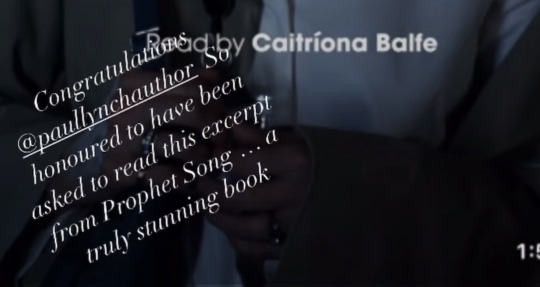
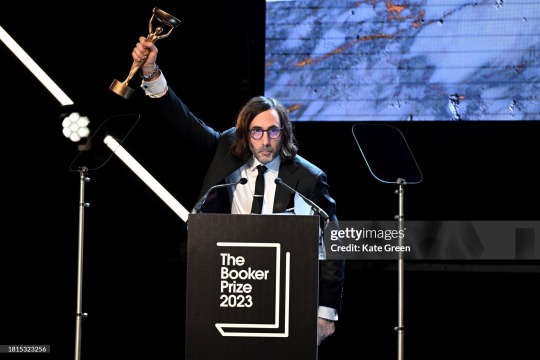
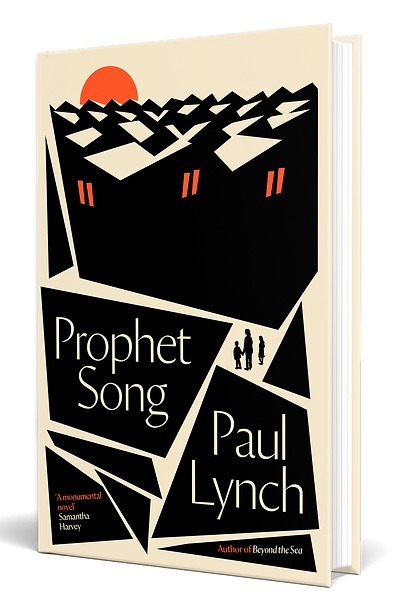
PaulLynchWriter
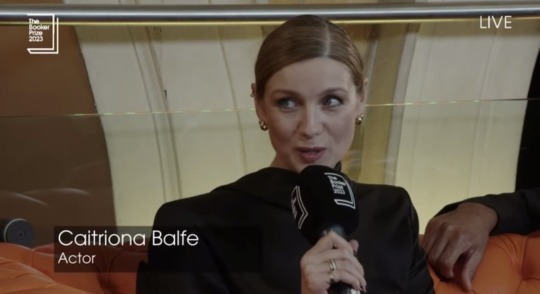
Video 📹 from Instagram
Remember her congratulating Paul Lynch, 2023 Booker Prize winner?
Brian’s related posts 1 2 3 4
#Tait rhymes with hat#Good times#Prophet Song#Paul Lynch#Winner#2023#Booker Prize#YouTube Live#Old Billingsgate#26 November 2023#London#Instagram Story#My screenrecording
21 notes
·
View notes
Text
NYT's Notable Books of 2023
Each year, we pore over thousands of new books, seeking out the best novels, memoirs, biographies, poetry collections, stories and more. Here are the standouts, selected by the staff of The New York Times Book Review.
AFTER SAPPHO by Selby Wynn Schwartz
Inspired by Sappho’s work, Schwartz’s debut novel offers an alternate history of creativity at the turn of the 20th century, one that centers queer women artists, writers and intellectuals who refused to accept society’s boundaries.
ALL THE SINNERS BLEED by S.A. Cosby
In his earlier thrillers, Cosby worked the outlaw side of the crime genre. In his new one — about a Black sheriff in a rural Southern town, searching for a serial killer who tortures Black children — he’s written a crackling good police procedural.
THE BEE STING by Paul Murray
In Murray’s boisterous tragicomic novel, a once wealthy Irish family struggles with both the aftermath of the 2008 financial crash and their own inner demons.
BIOGRAPHY OF X by Catherine Lacey
Lacey rewrites 20th-century U.S. history through the audacious fictional life story of X, a polarizing female performance artist who made her way from the South to New York City’s downtown art scene.
BIRNAM WOOD by Eleanor Catton
In this action-packed novel from a Booker Prize winner, a collective of activist gardeners crosses paths with a billionaire doomsday prepper on land they each want for different purposes.
BLACKOUTS by Justin Torres
This lyrical, genre-defying novel — winner of the 2023 National Book Award — explores what it means to be erased and how to persist after being wiped away.
BRIGHT YOUNG WOMEN by Jessica Knoll
In her third and most assured novel, Knoll shifts readers’ attention away from a notorious serial killer, Ted Bundy, and onto the lives — and deaths — of the women he killed. Perhaps for the first time in fiction, Knoll pooh-poohs Bundy's much ballyhooed intelligence, celebrating the promise and perspicacity of his victims instead.
CHAIN-GANG ALL-STARS by Nana Kwame Adjei-Brenyah
This satire — in which prison inmates duel on TV for a chance at freedom — makes readers complicit with the bloodthirsty fans sitting ringside. The fight scenes are so well written they demonstrate how easy it might be to accept a world this sick.
THE COVENANT OF WATER by Abraham Verghese
Verghese’s first novel since “Cutting for Stone” follows generations of a family across 77 years in southwestern India as they contend with political strife and other troubles — capped by a shocking discovery made by the matriarch’s granddaughter, a doctor.
CROOK MANIFESTO by Colson Whitehead
Returning to the world of his novel “Harlem Shuffle,” Whitehead again uses a crime story to illuminate a singular neighborhood at a tipping point — here, Harlem in the 1970s.
THE DELUGE by Stephen Markley
Markley’s second novel confronts the scale and gravity of climate change, tracking a cadre of scientists and activists from the gathering storm of the Obama years to the super-typhoons of future decades. Immersive and ambitious, the book shows the range of its author’s gifts: polyphonic narration, silken sentences and elaborate world-building.
EASTBOUND by Maylis de Kerangal
In de Kerangal’s brief, lyrical novel, translated by Jessica Moore, a young Russian soldier on a trans-Siberian train decides to desert and turns to a civilian passenger, a Frenchwoman, for help.
EMILY WILDE’S ENCYCLOPAEDIA OF FAERIES by Heather Fawcett
The world-building in this tale of a woman documenting a new kind of faerie is exquisite, and the characters are just as textured and richly drawn. This is the kind of folkloric fantasy that remembers the old, blood-ribboned source material about sacrifices and stolen children, but adds a modern gloss.
ENTER GHOST by Isabella Hammad
In Hammad’s second novel, a British Palestinian actor returns to her hometown in Israel to recover from a breakup and spend time with her family. Instead, she’s talked into joining a staging of “Hamlet” in the West Bank, where she has a political awakening.
FORBIDDEN NOTEBOOK by Alba de Céspedes
A best-selling novelist and prominent anti-Fascist in her native Italy, de Céspedes has lately fallen into unjust obscurity. Translated by Ann Goldstein, this elegant novel from the 1950s tells the story of a married mother, Valeria, whose life is transformed when she begins keeping a secret diary.
THE FRAUD by Zadie Smith
Based on a celebrated 19th-century trial in which the defendant was accused of impersonating a nobleman, Smith’s novel offers a vast panoply of London and the English countryside, and successfully locates the social controversies of an era in a handful of characters.
FROM FROM by Monica Youn
In her fourth book of verse, a svelte, intrepid foray into American racism, Youn turns a knowing eye on society’s love-hate relationship with what it sees as the “other.”
A GUEST IN THE HOUSE by Emily Carroll
After a lonely young woman marries a mild-mannered widower and moves into his home, she begins to wonder how his first wife actually died. This graphic novel alternates between black-and-white and overwhelming colors as it explores the mundane and the horrific.
THE HEAVEN & EARTH GROCERY STORE by James McBride
McBride’s latest, an intimate, big-hearted tale of community, opens with a human skeleton found in a well in the 1970s, and then flashes back to the past, to the ’20s and ’30s, to explore the town’s Black, Jewish and immigrant history.
HELLO BEAUTIFUL by Ann Napolitano
In her radiant fourth novel, Napolitano puts a fresh spin on the classic tale of four sisters and the man who joins their family. Take “Little Women,” move it to modern-day Chicago, add more intrigue, lots of basketball and a different kind of boy next door and you’ve got the bones of this thoroughly original story.
A HISTORY OF BURNING by Janika Oza
This remarkable debut novel tells the story of an extended Indo-Ugandan family that is displaced, settled and displaced again.
HOLLY by Stephen King
The scrappy private detective Holly Gibney (who appeared in “The Outsider” and several other novels) returns, this time taking on a missing-persons case that — in typical King fashion — unfolds into a tale of Dickensian proportions.
A HOUSE FOR ALICE by Diana Evans
This polyphonic novel traces one family’s reckoning after the patriarch dies in a fire, as his widow, a Nigerian immigrant, considers returning to her home country and the entire family re-examines the circumstances of their lives.
THE ILIAD by Homer
Emily Wilson’s propulsive new translation of the “Iliad” is buoyant and expressive; she wants this version to be read aloud, and it would certainly be fun to perform.
INK BLOOD SISTER SCRIBE by Emma Törzs
The sisters in Törzs's delightful debut have been raised to protect a collection of magic books that allow their keepers to do incredible things. Their story accelerates like a fugue, ably conducted to a tender conclusion.
KAIROS by Jenny Erpenbeck
This tale of a torrid, yearslong relationship between a young woman and a much older married man — translated from the German by Michael Hofmann — is both profound and moving.
KANTIKA by Elizabeth Graver
Inspired by the life of Graver’s maternal grandmother, this exquisitely imagined family saga spans cultures and continents as it traces the migrations of a Sephardic Jewish girl from turn-of-the-20th-century Constantinople to Barcelona, Havana and, finally, Queens, N.Y.
LAND OF MILK AND HONEY by C Pam Zhang
Zhang’s lush, keenly intelligent novel follows a chef who’s hired to cook for an “elite research community” in the Italian Alps, in a not-so-distant future where industrial-agricultural experiments in America’s heartland have blanketed the globe in a crop-smothering smog.
LONE WOMEN by Victor LaValle
The year is 1915, and the narrator of LaValle’s horror-tinged western has arrived in Montana to cultivate an unforgiving homestead. She’s looking for a fresh start as a single Black woman in a sparsely populated state, but the locked trunk she has in stow holds a terrifying secret.
MONICA by Daniel Clowes
In Clowes’s luminous new work, the titular character, abandoned by her mother as a child, endures a life of calamities before resolving to learn about her origins and track down her parents.
THE MOST SECRET MEMORY OF MEN by Mohamed Mbougar Sarr
Based on a true story and translated by Lara Vergnaud, Sarr’s novel — about a Senegalese writer brought low by a plagiarism scandal — asks sharp questions about the state of African literature in the West.
THE NEW NATURALS by Gabriel Bump
In Bump’s engrossing new novel, a young Black couple, mourning the loss of their newborn daughter and disillusioned with the world, start a utopian society — but tensions both internal and external soon threaten their dreams.
NORTH WOODS by Daniel Mason
Mason’s novel looks at the occupants of a single house in Massachusetts over several centuries, from colonial times to present day. An apple farmer, an abolitionist, a wealthy manufacturer: The book follows these lives and many others, with detours into natural history and crime reportage.
NOT EVEN THE DEAD by Juan Gómez Bárcena
An ex-conquistador in Spanish-ruled, 16th-century Mexico is asked to hunt down an Indigenous prophet in this novel by a leading writer in Spain, splendidly translated by Katie Whittemore. The epic search stretches across much of the continent and, as the author bends time and history, lasts centuries.
THE NURSERY by Szilvia Molnar
“I used to be a translator and now I am a milk bar.” So begins Molnar’s brilliant novel about a new mother falling apart within the four walls of her apartment.
OUR SHARE OF NIGHT by Mariana Enriquez
This dazzling, epic narrative, translated from the Spanish by Megan McDowell, is a bewitching brew of mystery and myth, peopled by mediums who can summon “the Darkness” for a secret society of wealthy occultists seeking to preserve consciousness after death.
PINEAPPLE STREET by Jenny Jackson
Jackson’s smart, dishy debut novel embeds readers in an upper-crust Brooklyn Heights family — its real estate, its secrets, its just-like-you-and-me problems. Does money buy happiness? “Pineapple Street” asks a better question: Does it buy honesty?
THE REFORMATORY by Tananarive Due
Due’s latest — about a Black boy, Robert, who is wrongfully sentenced to a fictionalized version of Florida’s infamous and brutal Dozier School — is both an incisive examination of the lingering traumas of racism and a gripping, ghost-filled horror novel. “The novel’s extended, layered denouement is so heart-smashingly good, it made me late for work,” Randy Boyagoda wrote in his review. “I couldn’t stop reading.”
THE SAINT OF BRIGHT DOORS by Vajra Chandrasekera
Trained to kill by his mother and able to see demons, the protagonist of Chandrasekera’s stunning and lyrical novel flees his destiny as an assassin and winds up in a politically volatile metropolis.
SAME BED DIFFERENT DREAMS by Ed Park
Double agents, sinister corporations, slasher films, U.F.O.s — Park’s long-awaited second novel is packed to the gills with creative elements that enliven his acerbic, comedic and lyrical odyssey into Korean history and American paranoia.
TAKE WHAT YOU NEED by Idra Novey
This elegant novel resonates with implication beyond the taut contours of its central story line. In Novey’s deft hands, the complex relationship between a young woman and her former stepmother hints at the manifold divisions within America itself.
THIS OTHER EDEN by Paul Harding
In his latest novel, inspired by the true story of a devastating 1912 eviction in Maine that displaced an entire mixed-race fishing community, Harding turns that history into a lyrical tale about the fictional Apple Island on the cusp of destruction.
TOM LAKE by Ann Patchett
Locked down on the family’s northern Michigan cherry orchard, three sisters and their mother, a former actress whose long-ago summer fling went on to become a movie star, reflect on love and regret in Patchett’s quiet and reassuring Chekhovian novel.
THE UNSETTLED by Ayana Mathis
This novel follows three generations across time and place: a young mother trying to create a home for herself and her son in 1980s Philadelphia, and her mother, who is trying to save their Alabama hometown from white supremacists seeking to displace her from her land.
VICTORY CITY by Salman Rushdie
Rushdie’s new novel recounts the long life of Pampa Kampana, who creates an empire from magic seeds in 14th-century India. Her world is one of peace, where men and women are equal and all faiths welcome, but the story Rushdie tells is of a state that forever fails to live up to its ideals.
WE COULD BE SO GOOD by Cat Sebastian
This queer midcentury romance — about reporters who meet at work, become friends, move in together and fall in love — lingers on small, everyday acts like bringing home flowers with the groceries, things that loom large because they’re how we connect with others.
WESTERN LANE by Chetna Maroo
In this polished and disciplined debut novel, an 11-year-old Jain girl in London who has just lost her mother turns her attention to the game of squash — which in Maroo’s graceful telling becomes a way into the girl’s grief.
WITNESS by Jamel Brinkley
Set in Brooklyn, and featuring animal rescue workers, florists, volunteers, ghosts and UPS workers, Brinkley’s new collection meditates on what it means to see and be seen.
Y/N by Esther Yi
In this weird and wondrous novel, a bored young woman in thrall to a boy band buys a one-way ticket to Seoul.
YELLOWFACE by R.F. Kuang
Kuang’s first foray outside of the fantasy genre is a breezy and propulsive tale about a white woman who achieves tremendous literary success by stealing a manuscript from a recently deceased Asian friend and passing it off as her own.
240 notes
·
View notes
Text
Pictures of You - Roy Kent x Reader

Tagging: @elizabeththebat @proceduralpassion @crazy4chickennuggets @callsignartemis @kmc1989 @@anyamcdonald @taytaylala12 @daydreamgoddess14 @amieinghigh @littleesilvia @blackleatherjacketz @xphantomphanphanaticx @its-a-show-stoppin-number @st4rgirliesstuff @secretsquirrelinc @meg-ro @xoxabs88xox @midnightmagpiemama

Roy’s in the locker room when Trent approaches him. He’s listening to a conversation between Issac and Colin with his arms crossed over his chest, when he catches the expression on the other man’s face. He knows that somethings wrong, he can feel it in the pit of his stomach. When Trent tilts his head towards the empty manager’s office, Roy follows without hesitation.
At first, he thinks it’s something to do with one of the lads, a story that’s about to break, a leak about Colin’s private life. A surge of protectiveness rushes through him, if that’s the case, he’s going to hunt down the piece of shit that told the press and strangle them with his bare hands.
It’s only when Trent shows him the image on his phone that Roy understands the magnitude of the situation. His mouth goes dry, he rubs his palm across his stubble as he surveys the headline.
Kent’s Kinky Caster.
The picture that accompanies it is one that he’s never seen before. Your hair is longer, it falls across your shoulders as you bite your lower lip. Your thumb is drawing down the strap of the midnight-blue corset that you’re wearing. It accentuates your curves, pushing up your breasts.
You look fucking fantastic but it’s not you, he knows that you prefer lace and silk. Materials that cling or drape, that don’t dig in or contort your shape. He prefers you comfortable when you’re with him, not trussed up in something that’s going to leave marks across your skin.
“They must have hacked your phone.” Trent summarises as he takes back the device and slips it into his pocket.
“Not mine.” Roy says gruffly as he drops into Beard’s vacant seat. “I’ve never seen that picture before, the shit she sends me…” Roy trails off before he meets Trent’s gaze. “It’s classy, nothing like that.”
Trent bows his head in understanding. The picture that’s been delivered to the papers is one of a woman who’s trying so hard to be something else, for someone else. You’ve come a long way since then. He should know, he’s been your friend and confident for a few of years by now. The two of you had worked together for The Independent once upon a time. You’d been an investigative reporter before moving onto the podcasting world, and a damn good one at that.
The two of you still caught up every couple of weeks for drinks. He was one of the first people to know about your blossoming relationship with Roy Kent. You had no idea who he was initially, and Trent had found that endearing.
He suspects that the photograph has come from your ex-Martin. Trent knows that he will claim that his phone had been hacked but realistically no one hacks the phone of a Booker Prize Winner. Nobody cares who they’re sleeping with.
Trent recalls he’d made a nuisance of himself in the aftermath of the breakup. Turning up at your house all hours of the day and night until you’d sought a restraining order. After that he would bad mouth you to anyone that would listen, which is why Roy had headbutted him last month at a Save the Polar Bears event. Trent had gifted him an expensive bottle of Scotch with a card that read “Because you did what I’ve wanted to do for a very long time.”
“I’ve put a few messages out to my contacts.” Trent informs Roy, crossing his arms over his chest as he leans against Beard’s desk. “I should hear back from them soon.”
“I did this.” Roy tells the other man as he rubs his hands over his face in exasperation. “It’s because I headbutted him at the fucking Panda thing isn’t it?”
“Polar bears.” Trent corrects before sighing. “I think you give yourself too much credit. Martin’s had a bee in his bonnet because SHE left him.”
“Yea.” Roy snarls, his dark eyes practically glowing with rage. “Because she walked in on him fucking a Page Three model in her bed, if it was me, I would have painted the room with his innards.”
It’s a vivid image, Trent has to give him that.
“He doesn’t like that she’s happier than him, more successful. The fact she’s with someone who actually cares about her, who gives her what he couldn’t.” Trent says taking off his glasses and gesturing with them as he speaks. “Being the type of man that he is, it probably sent him off the deep end.”
“That doesn’t excuse this type of shit.” Roy snaps, sagging back into the chair in frustration. He’s helpless right now, utterly fucking helpless and he hates it. The story is already out there. Every fucking pervert on the internet is probably wanking off to that picture of you and you have no fucking idea because you’re on a flight home from Ireland. He knows this is going to devastate you and he can’t stand the thought of it.
He looks up at Trent, his expression one of anguish.
“This is going to kill her.”
Love Roy? Don’t miss any of his stories by joining the taglist here.
Want more Roy? Check out his Masterlist!
Interested in supporting me? Join my Patreon for Bonus Content!
Like My Work? - Why Not Buy Me A Coffee

180 notes
·
View notes